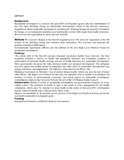The position of health in sustainable development negotiations: a survey of negotiators and review of post-Rio+ 20 processes

View/
Date
2013Author
Eliasz, Michael W K
Neil, De Laplante
Anneleen, Boel
Makuka, Gerald J
Kimberly, G Williams
Walumbe, Rispah J
Laura, Bertani
Claudel, Petrin-Desrosiers
Aliye, Runyan
Elizabeth, Wiley
Usman, Mushtaq
Arthur, Mello
Sudvhir, Singh
Jonathan, Meldrum
Roopa, D hatt
Language
enMetadata
Show full item recordAbstract
Background
Sustainable development is central to the post-2015 development agenda after the establishment of the
UN Open Working G
roup on Sustainable Development Goals at the Rio+20 conference. Negotiations about
sustainable development, including the Working Group, are typically undertaken by foreign or environmental
ministries and traditionally involve little input from health ministries. We reviewed the negotiations to assess the role
of health.
Methods
We assessed changes to the Rio+20 negotiation text. We surveyed negotiators at the 4th session of the
W
orking G
roup and reviewed their discussions. We reviewed and analysed the position of health in Multilateral
Environmental Agreements (MEAs) and the methods of the new High Level Political Forum for sustainable
development.
Findings
The initial draft of the Rio+20 outcome document mentioned health twice; however, the fi
nal
document
included a section on health and population dynamics and committed countries to achievement of universal health
coverage and use of health indicators for sustainable development. M
ost governments discussed the links between
health and sustained development. The delegates surveyed agreed that health should be integrated into other areas of
sustainable development—eg, energy, education, and employment. The objective of the most recent MEA—the
Minimata Convention on Mercury—was to protect human health; which was also the aim of many other MEAs. The
High Level Political Forum does not explicitly refer to health in its methods but includes a review of environmental,
economic, and social aspects of sustainable development commitments similar to the Universal Periodic Review of
the UN Human Rights Council.
Interpretation
Health is central to sustainable development and governments recognise its cross-cutting nature. The
inclusion of health to date is the result of active engagement by the health community
, which must be sustained to
keep health at the centre of the post-2015 development agenda. Improved health data, collected more of
ten, could
improve accountability in the periodic review process of the High Level Political Forum and for the non-health
sustainable development goals.
Funding
International Federation of Medical Students Associations.
Citation
Eliasz, Michael W. Kalmus, et al. "The position of health in sustainable development negotiations: a survey of negotiators and review of post-Rio+ 20 processes." The Lancet 382 (2013): 16.Publisher
University of Nairobi
